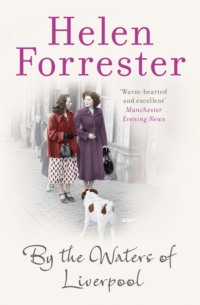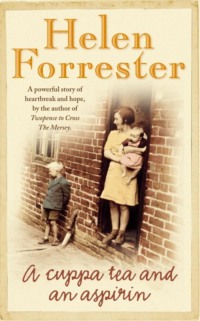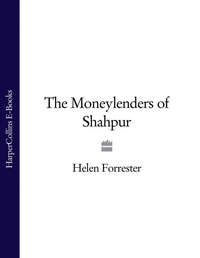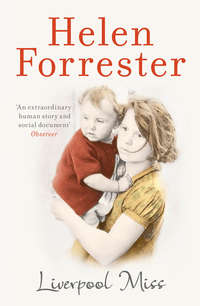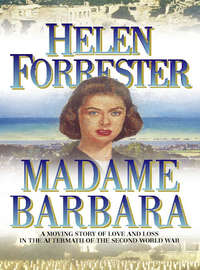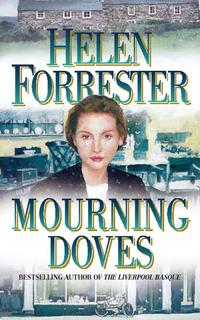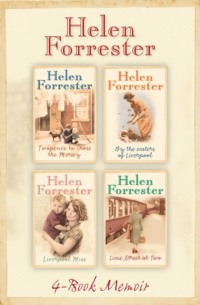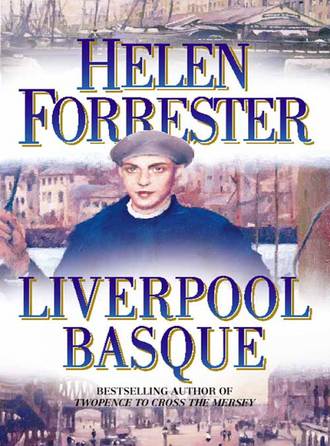
Полная версия
The Liverpool Basque
A further diversion, which relieved Pedro’s feeling of strangeness in his own home, was created by the sound of hob-nailed boots in the hall, as Jean Baptiste Saitua and two of his sons stepped tentatively through the open front door; it did not take long for the Basque community to learn through the grapevine any bit of news, like a return from sea, and these old friends of the entire family felt free to step in and inquire how Pedro was.
Grandpa leaned back in his chair to look down the hall. ‘Come in,’ he shouted. ‘How are you, Jean – Domingo – Vicente?’
They tramped in and shook Pedro’s hand and slapped him on the back, while Rosita quietly slid over to the fireplace, to remove the chicken casserole from the oven and place it on the warming shelf above the fire; she winked at Aunt Maria, sitting quietly watching the scene. ‘Heaven only knows when we’ll get our tea,’ she muttered to her sister. ‘Would you like another glass of wine?’
Maria smiled gently and nodded. ‘Yes.’
Grandma, equally resigned to a long session of male reminiscences, was already getting more glasses and another bottle of wine. Jean Baptiste was a bosun with a small Basque shipping company sailing out of Liverpool; he had a couple of nights’ leave. Domingo was a ferryman, and Vicente was in his last year at school. After much joking, Vicente was allowed a glass of wine, though Jean Baptiste said his mother would probably be after him, if she smelled it on his breath.
The cakes intended for dessert were brought out and handed round, and the party became quite merry. Pedro abandoned hope of a bath that evening, and Rosita was beginning to wonder if she could stretch her chicken casserole to feed three extra men, when Maria began to cough violently. The hilarity ceased immediately, and Grandma said, ‘Don’t worry. I’ll take her upstairs – it’s just the smoke.’
Fat, jolly Jean Baptiste quickly rose from the table, however, his heavy jowls suddenly drooping. ‘Ah! I forgot!’ He looked round the room, thick with blue tobacco smoke. ‘I’m sorry, Maria.’ He turned to Grandpa, and said, ‘We can meet in the Baltic later on; some of the other lads’ll be sure to be there.’
With grave dignity, he eased himself and his sons out of the crowded room, calling his thanks to Grandma for the wine and cake.
His sons clattered down the steps to the pavement, while he paused at the top, to speak to Juan and Pedro. ‘The wife told me Maria was back home. I thought she must be well again. How is she?’
Grandpa’s shoulders went up in a hopeless shrug. ‘They can’t do anything for her – but you mustn’t worry about the tobacco smoke; she loves to be part of what’s going on. If we put her upstairs all the time, she’d die of loneliness.’
‘Of course, poor girl. It must be a terrible worry to you.’
He turned to Pedro. ‘See you later, lad.’
And Pedro, who simply wanted to go to bed with his wife, nodded agreement.
Chapter Nine
While Micaela unbolted the back door to open it, to let out the tobacco smoke, Rosita quickly filled a glass of water and handed it to Manuel. ‘Give this to Auntie; it’ll help her stop coughing.’
The little boy obediently took the glass over to his struggling aunt. Rosita leaned over the sink to heave up the sash window; it had been partially open during the Saituas’ visit; now she struggled to push it up further, but after a couple of inches, it stuck in its rotting wooden frame. ‘Blast,’ she muttered, ‘I’ll have to tell the rent collector when he comes.’
Micaela pushed her slightly aside, so that she could damp a towel under the tap. As she turned and wiggled her way between the scattered kitchen chairs to get to Maria, she said grimly, ‘You can tell him – but don’t expect him to do anything. Better to get your father to have a look at it.’
Maria had been coughing so violently that she had not been able to take the glass of water from Manuel; he was standing by her, wide-eyed, not knowing what to do.
The sick woman held a big man’s handkerchief over her mouth to catch the blood-streaked phlegm which she was coughing up.
‘It’s all right, Mannie, dear. Put the glass on the little table, and go and help your mam.’ Micaela gently wiped her daughter’s face with the damp cloth, and, as fresh air entered the room, the coughing lessened enough for Maria to be eased on to the oil-cloth-covered sofa and be propped up with a myriad of patchwork cushions. Her mother covered her with a knitted shawl, and persuaded her to take a sip or two of water.
After chatting for a minute or two with Jean Baptiste Saitua, Juan and Pedro sat down on the front doorstep to continue their smoke. They remained there, in companionable silence, until Rosita called them in to eat.
While Rosita took a bellowing Francesca out of her cradle and put her to the breast under the cover of her shawl, Micaela served the family. She put a plate of food in front of Rosita, so that she, too, could eat, while nursing the baby.
Before sitting down, Pedro looked across at his sister-in-law, lying limply on the sofa. ‘Sorry the smoke made you cough, Maria. Cigarette smoke’s the worst. I’ll smoke outside in future.’
The kindly meant words spoken softly in Basque brought tears of weakness to Maria’s eye. She made a small gesture with her hand, as if to say it did not matter.
Micaela took a little bowl, put a spoonful of rice in it, and covered it with a ladle of gravy from the casserole. Very slowly, teaspoonful by teaspoonful, she got the food into the invalid. Only then did she sit down to eat herself.
Pedro had been praising the dinner to Rosita, and she smiled happily, while she shifted the baby to the other breast. She remembered suddenly what had happened when she had bought the hens in the market, and she told him the story of the third hen, retrieved from the bank windowsill.
Juan was silent during this recital. He carefully masticated his last piece of chicken and swallowed it, and, with his fingernail, released a bit of meat that had lodged between his front teeth. He did not laugh at the story; he sounded grumpy, as he said, ‘I hope you paid for that chicken?’
Rosita laughed. ‘We paid for the two we bought.’
‘The third one was dead when we found it,’ Micaela told him. She obviously expected Juan to shrug and say no more. But the old man stiffened up. He rubbed his beard, as he always did when thinking something over. ‘So you didn’t pay for it?’
‘Well, of course not. We just found it dead.’ She put down her fork.
‘But it was still good enough to eat?’
‘You’ve just eaten it! Rosita wouldn’t cook anything that had gone bad.’
Grandpa looked at her frigidly. ‘In that case, shouldn’t you have gone back and paid for it?’
Micaela was annoyed at this. She replied huffily. ‘It was lost – and we found it. Anybody else who’d found it would have taken it.’
‘But you asked for the cage to be opened. If you hadn’t, it would not have been lost.’
Manuel realized that a sharp family tiff was in the offing, and he wondered if he could get down from the table, without first asking Grandpa. His grandfather was looking extremely grim, however, and he decided he had better sit very quietly and not draw attention to himself.
Micaela tossed her head. ‘Tush!’ she exclaimed. ‘The poultry man must’ve believed it had got crushed underfoot in the crowd – or in the traffic. He’ll never know we found it.’
Juan’s long, dark face darkened further, his beard tilted up as if in pride. Pedro discreetly kept his mouth shut.
‘My dear, it should be paid for; it was our fault it was lost.’ Though the words were not unkind, it was an order.
‘Juan! You’re being unreasonable. You really are.’ Impatiently, Grandma made to rise from the table. ‘He’ll have forgotten about it by now.’
‘I want it paid for. He won’t’ve forgotten that the whole hassle was caused by a bunch of Basque women, and he’ll talk about it. We’ve got to live here; and we Basques have a good reputation – and it’s small things that keep that reputation up.’ He slapped his hand crossly on the tabletop. ‘And what will your grandchild think? That if he can get away with something, it’s automatically all right?’ His gold tooth flashed between his beard and his moustache. ‘Not on your sweet life! What a Basque takes, he pays for.’
‘Really, Juan!’ Grandma was trembling now, her face flushed, her fingertips on the table to steady herself. Rosita opened her mouth to join in, but was quelled by a look from Juan.
‘Listen to me. You and Manuel – I want him to go, too – go back to the market tomorrow and pay for that bird.’
‘But, Papa …’
‘Tomorrow!’
Grandma took a big breath, and then said, ‘Well, if you feel that strongly about it, Manuel and I can walk up and do it.’ Then she spat out, ‘But I think you’re being terribly fussy!’
Grandpa got up from the table. ‘I know what I’m about,’ he growled. ‘Come on, Pedro, let’s get down to the Baltic; Jean Baptiste’ll be waiting.’
Chapter Ten
Calmly clipping the hedge in the early-morning peace of his Victoria garden, Old Manuel smiled over this episode, which he had included in his notes for Lorilyn as an example of the stiff honesty of Basques; and wondered if he should also include what extraordinarily able smugglers they were.
‘What are you laughing at?’ asked a cheery voice from behind the hedge.
Surprised at his peace being intruded upon, he told Sharon Herman that it was a memory of his childhood; and continued clipping along the hedge, while he asked politely how she was.
Sharon had a plate of buttered toast in her hand, and as she followed him down the hedge, she continued to eat. ‘I’m just fine,’ she told him. ‘Got myself an apartment, but the possession date isn’t for a month. So Veronica says to stay with her till it’s ready.’
‘She’s very kind,’ Old Manuel replied dryly, and put his shears down, while he pulled at an old bird’s nest tangled in the hedge.
‘She is, isn’t she?’
I wish Veronica wasn’t so persistent, thought Old Manuel. High above his neighbour’s roof a gull soared effortlessly and he speculated idly that in another few seconds it would dive to snatch a piece of Sharon’s toast. But she turned suddenly towards him, and the gull flew swiftly seaward.
‘Tell me what you were laughing at,’ she demanded playfully.
He told her the story of the lost hen. ‘My grandfather knew that it isn’t enough to be honest – if you were foreign immigrants, like we were, you’ve got to be seen to be honest.’
As he slowly clipped his way down the length of the hedge, he told her of his Basque origins and the tiny community near the Wapping Dock. Then he paused, to hold his shears in his left hand, while he carefully stretched the fingers of his right hand. He saw her glance at his hand, and said, with a rueful smile, ‘It’s a touch of arthritis. Hurts sometimes.’
She nodded sympathetically, and he went on, ‘I never thought of being foreign – I were born in Liverpool and christened in St Peter’s. All the little kids I played with were born there – though their dads came from all over the world – as near as Ireland or as far as the Philippines.’
‘Like Canada.’ Sharon bit into another piece of toast with strong, even teeth.
He agreed. She looked much healthier than she had done when Veronica had brought her to his house, and he was glad. Her fair skin had acquired a slight tan, and her blonde hair was blowing in a wild tangle in the wind. She wasn’t exactly pretty, but she had a pleasant open look about her and her figure had a cuddly roundness which reminded him of his mother. She was very likeable, he decided. Easy to talk to.
‘I’ve got to get to work,’ she told him briskly, and his wise eyes nearly vanished amid the wrinkles, as he smiled goodbye to her.
The next time he saw her she was seated on a huge log on the beach, staring disconsolately out on to a placid pale-blue sea. She was obviously crying, her shoulders heaving under her sweater.
He hesitated in embarrassment. They were the only people on the shore that morning. She must have felt sure of her solitude to cry so openly, he debated uncertainly with himself. Should he go to her or not?
Aware of a sense of inadequacy at the idea of dealing with a young woman’s tears, he decided to avoid invading her privacy, so he curved up the beach to pass well behind her. He was sure that she had not noticed him, but the crunch of pebbles under his feet drew her attention, and she turned a woebegone face towards him. She lifted a hand in slow salute and, embarrassed, he waved back, continuing to plod slowly on his chosen route.
She quickly took a paper handkerchief out of her pocket and wiped her face and blew her nose. He had only just passed her when she shouted, ‘Are you walking home?’
He stopped, and nodded his head a little guiltily.
‘Wait a minute, and I’ll walk with you.’
‘I’m rather slow,’ he called back. Though her distress troubled him, he hoped she would change her mind and allow him to go on walking alone. She ran lightly over the pebbles, however, until she reached him.
He looked her up and down in a bemused way. She had cried enough to make her face swollen and her eyes mournful; yet she did not seem to want to hide it. ‘I guess you didn’t hurt yourself, if you can run like that,’ he remarked tentatively, to give her an opening if she wished to explain her distress.
As she fell into step alongside him, she asked with a tight, wry grimace, ‘You mean you thought I was crying because I’d fallen or something?’
He considered her query, and then said, ‘Well, I didn’t know. I didn’t want to intrude. I thought I should let you be.’
She sighed. ‘I’m OK. I was feeling a bit down, that’s all – a bit lonely in a new place, I guess.’
Walking on pebbles was tiring him, and he wished he had taken the path at the top of the cliff. ‘You’re working in the new ward at the hospital, I think Veronica mentioned?’
‘The Palliative Care Unit? Yes.’
‘Patients who are going to die are put in there? Must be hard on you.’
‘Not really.’ She went on to tell him how worthwhile she thought her work was. Her enthusiasm surprised him.
Though he was interested in what she was saying, he began to feel that he must sit down to rest; there was an unpleasant tightness in his chest. He stopped, and said, ‘At the top of the cliff staircase here, there’s a little park kiosk that sells coffee. Would you like a cup?’ He was panting slightly and his speech came slowly. ‘We have to get up the cliff, somewhere, to get home.’
She looked at him with concern. ‘Could you climb the steps all right?’
‘If I do a few at a time.’
She was immediately practical. ‘Let’s sit on the bottom steps for a few minutes – until you get your breath.’
Manuel thankfully sat down suddenly on the steps, and they listened to the waves lapping on the beach for about ten minutes. Then she asked, ‘Have you seen your doctor lately?’
Manuel’s mouth turned up in a quick grin; he was feeling better. ‘Saw him in the winter. He always says the same thing – you’re in great shape – for your age! He’s a nice kid.’
She laughed. A wonderful old dear, gentle to the point of passivity.
She judged him wrongly. Manuel was feeling a little exhausted – but he was cussing inwardly at his weakness. He got slowly to his feet, and looked down at her quite blankly. What was the girl’s name? For the life of him, he could not recall it.
Unaware of his dilemma, she took his hand to help him up the wooden staircase.
‘I’m all right,’ he told her a trifle peevishly, and she quickly withdrew her hand. Old people could be quite tetchy about being helped, she knew.
Over coffee and muffins, which he insisted on paying for, he sat quietly for a few minutes, thinking that Jack Audley would be highly amused when he told him that he had, that morning, taken a bright young thing out to coffee!
‘Why were you crying?’ he finally asked her baldly, and then felt that he was being inquisitive and should not have said anything. She answered him without hesitation, however, and told him, ‘We lost a patient last night, not unexpectedly. It was her widowed daughter’s reaction that got me. She had lived with her mother for years. She’s got no children; and she was beside herself.’ She paused, her expression desolate. ‘I guess I could relate to her feeling of being bereft.’
‘How do you mean?’
‘The feeling that nobody is left to care what happens to you.’
‘Tush. A bright young woman like you must have lots of friends – and even parents still alive!’ He tried to sound cheering.
Sharon bit her lower lip. ‘Well, you see I’m divorced, and I don’t have any kids – and Mum and Pop live in Florida; I’m their only child.’ She sighed. ‘When I was married, I went to live in Toronto. My husband wasn’t the social type, so we didn’t make any friends to speak of. I was a fool to marry him. We weren’t really suited to each other from day one.’
He nodded understandingly. ‘So what brought you here?’
‘Well, I need to work – and I’m a qualified nurse. I saw the ad for this job at the hospital, and applied. When I was a very little girl, I lived here – and it’s such a truly beautiful place. I’m glad I came – but I’ve got to start again, making friends.’ She smiled suddenly, and said, ‘At least I’ve made one, haven’t I?’
Manuel gave a little chuckle. ‘Of course,’ he assured her. Loneliness makes strange bedfellows, he thought with amusement; then decided hastily that ‘bedfellows’ was not quite the word – not at your age, old boy, he told himself.
She caught the smile that flicked across his face. ‘Now, what are you laughing at?’ she demanded, smiling herself.
‘I don’t think I can explain it to you,’ he replied with a chuckle. Then he laughed.
Laughter is infectious and soon they were giggling like a couple of children, about nothing.
Nevertheless, when he got home, he was thankful to crawl on to his bed. But he was still smiling to himself.
Chapter Eleven
In June 1914, Rosita announced that she wanted Pedro’s family to see Francesca, who was their first granddaughter; Pedro himself was at sea, but to Juan and Micaela it seemed a good opportunity to take a holiday, so a visit to Spain was arranged. Little Manuel was thrilled.
Juan tried to persuade Maria to accompany them. ‘You could go up into the mountains with Rosita to visit the Echaniz family, while your grandmother and I are in Bilbao. It would do you good to breathe mountain air,’ he told her.
Maria was feeling a little better and, at first, had been tempted to make the journey. Then, when she discovered that the family would be travelling by sea, she said she could not face being seasick.
Though horribly disappointed, Micaela said she would remain at home to care of her.
Rosita looked at her mother’s bent, tired figure and, at first, said nothing; instead, she went to see Bridget Connolly next door. Rosita often looked after Mary and Joey, when their mother was helping to nurse a sick neighbour or delivering a baby. Now, she asked a favour on Micaela’s behalf.
Would Bridget keep an eye on Maria, if Micaela went to Spain for three weeks in July? If Bridget could watch her during the day and cook for her, she thought that Mrs Saitua’s daughter, Panchika, could be persuaded to sleep overnight in the Barinèta home and give Maria a bit of breakfast.
‘Panchika doesn’t have to be at work till eight o’clock,’ she explained to Bridget. ‘She’s got a daily job as a cook-general in a fine house in Princes Road, with very nice people.
‘Maria can get herself to the can in the yard, now,’ she added. ‘And she can keep a fire going, if someone’ll bring in the coal for her and start it each morning. And she can wash her hands and face at the kitchen sink. But she’s not strong enough to stand and cook – or go to the shops, or anything like that.’
Bridget was seated by her own fire, sipping a mug of vintage tea – it had been simmering on the hob for hours. At Rosita’s suggestion, she nodded her head; her black hair was done up in untidy, coiled plaits, from which the hairpins constantly threatened to fall out; before answering Rosita, she absently pushed one back into her hair.
Plump, patient and very knowledgeable about the needs of the sick, she looked up at her neighbour, and said, ‘Oh, aye, I could do that, if you could manage to pay for the food I’d give her. It’d only be the price of a potato or two and what we’re havin’ ourselves – me housekeeping won’t stretch to feed another.’ At the latter statement, her voice was full of apology.
‘I’d get the coal up from the cellar for her, Mam,’ her daughter Mary volunteered; she had been listening avidly to what Rosita had had to say. ‘And I could chop some wood chips for her every day – and put it all in the hearth. It wouldn’t take a minute, then, for Panchika to make her fire for her.’
Panchika Saitua, a grumbling, middle-aged spinster, was ordered by her mother to sleep in her neighbour’s bedroom and to get up half an hour earlier, so that she could build Maria’s fire for her and give her tea and bread and margarine for breakfast.
Although she had not seen so much of her since she had been in service, Panchika knew Maria quite well; her working day was long and exacting and the idea of making the effort to visit someone, except, perhaps, on her Sunday off once a month, filled her with added gloom.
In the event, however, she thoroughly enjoyed her time with Maria, away from under her mother’s thumb. They spent an hour or two each evening before bedtime contentedly commiserating with each other; so much so, that, even after the family returned from Spain, Panchika discovered that she could endure to walk down the road in her carpet slippers, in the late evening, for an hour’s visit to Maria.
Maria was very appreciative of her visits, and missed her sorely when she failed to let herself in and come through to Rosita’s busy kitchen, to sink on to the chair by the old sofa, and gasp, ‘Ee! Me pore feet!’
Once the trip to Bilbao had been arranged, the family looked forward to it very much. The summer of 1914 was a gorgeous one and they could hope for a pleasantly calm passage. Grandma included in the food basket a gift of fresh eatables for the crew, whose diet was very monotonous. The present was much appreciated.
It was clear that Juan enjoyed such temporary returns to sea. It gave him a fresh audience of younger Basques, to whom he could relate stories of his early days sailing before the mast, when they had none of these new-fangled steam engines. ‘Seamanship was seamanship, in those days,’ he told them. ‘Rounded the Horn four times, I did, in storms like you’d never believe – and the cold!’ He shuddered.
This time, one young man told him, with equal pride, that he’d gone through the Panama Canal on an experimental voyage the previous year. ‘We were scared stiff,’ he said, ‘because we were afraid landslides would block us in, and we’d die of fever if we had to come out overland.’
‘Oh, aye. You’re right about the fever. That canal’s a waste of good money. Whole crews’ll get fever going through it – like the navvies building it get sick and die.’
When they arrived in Bilbao, they were met by Juan Barinèta’s brother, who looked even tougher and older than Juan himself. Little Manuel viewed him with awe. Rosita said he worked in an iron foundry, and that that accounted for the mass of white scars that crisscrossed his hairy arms, his hands and his face. ‘They’re from burns,’ she explained.
Great-uncle was a widower. His two single daughters looked after him; they also took care of Uncle Agustin, Rosita’s brother, when he was in port or out of work. Both young women did piecework at home, and their eyes were black-rimmed and bloodshot from long hours spent peering at the silk shawls they embroidered. They were gentle creatures, who, much to Manuel’s annoyance, adored baby Francesca and presented her with an exquisitely embroidered bonnet which they had made for her. They patted him on his head and exclaimed at how much he had grown; then they encouraged him to go out into the street to play with another small boy, who had wandered in from next door, to stare at the new arrivals.


